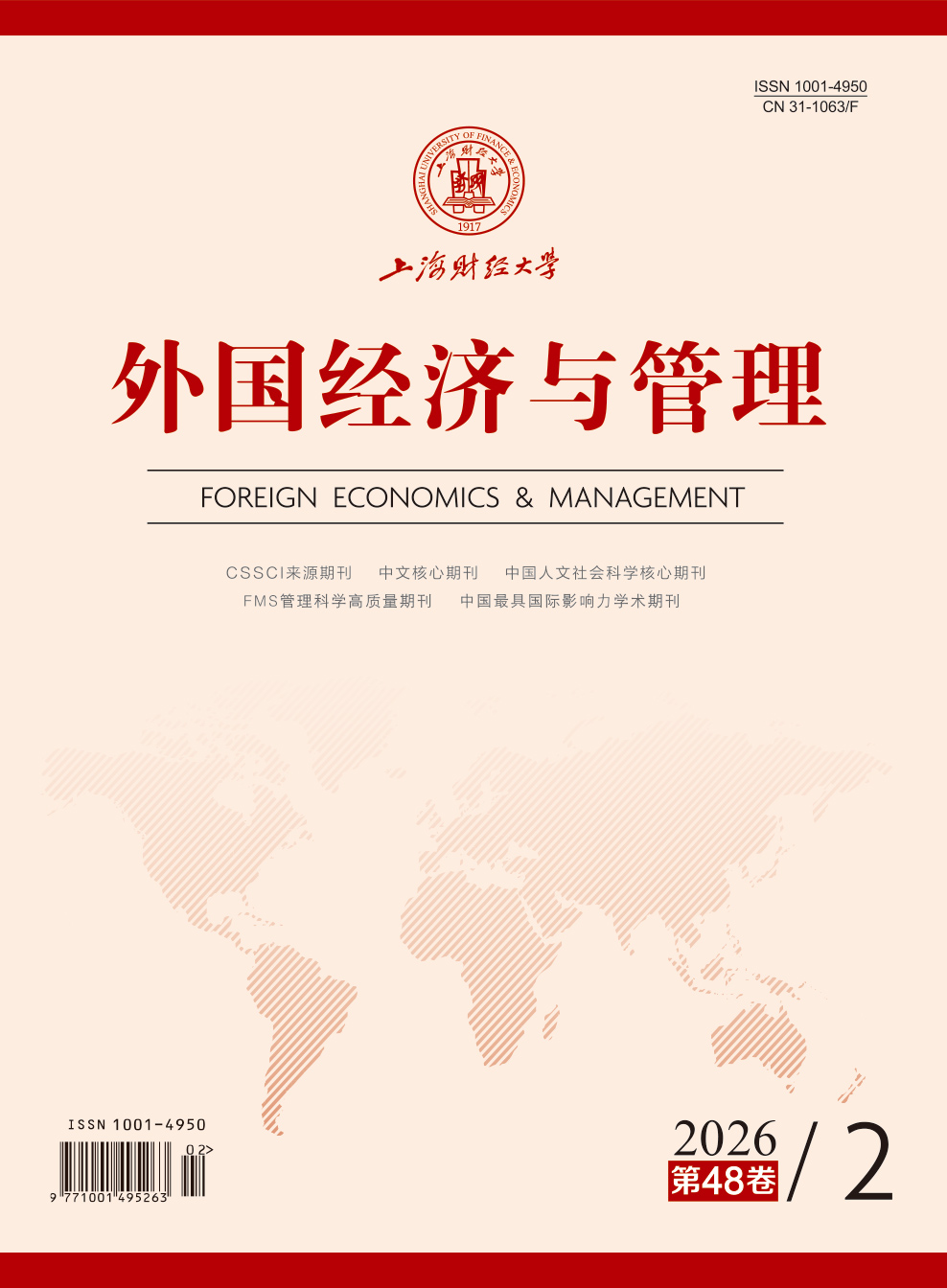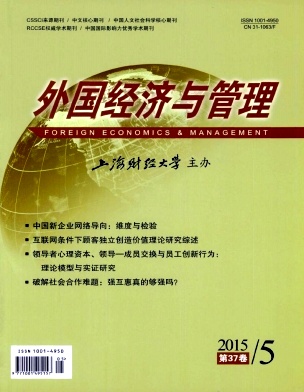国外期权激励诱发高管择时行为研究述评及对中国的启示
外国经济与管理 2015 年 第 37 卷第 05 期, 页码:
摘要
参考文献
摘要
由于存在高管自利择时行为,期权激励有可能无法实现缓解公司高管与股东利益冲突的激励相容目标。本文从高管在期权激励契约的授予、行权及行权所得股票的出售三个环节中的事前信息披露时间操纵和事后倒签这两类择时行为出发,对国外相关研究文献进行了梳理和评述。在此基础上,根据我国的高管期权激励制度和相应的税收制度安排,阐述了实施期权激励的高管为了最大化自身期权激励净收益,在激励计划披露、行权以及行权所得股票的出售等关键环节也存在的自利择时行为动机;并结合我国公司治理环境,剖析了股东治理、董事会治理对期权激励中的高管择时行为的影响。本文对于丰富和深化我国期权激励中高管行为的研究具有启发意义。
[1]Aboody D J and Kasznik R.CEO stock option awards and the timing of corporate voluntary disclosures[J].Journal of Accounting and Economics,2000,29 (3):73-100.
[2]Aboody D J,et al.Are executive stock option exercises driven by private information?[J].Review of Accounting Studies,2008,14:551-571.
[3]Bebchuk L A and Fried J M.Executive compensation as an agency problem[J].Journal of Economic Perspective,2003,17 (3):71-92.
[4]Bebchuk L,et al.What matters in corporate governance[J].Review of Financial Studies,2009,22 (2):783-827.
[5]Bebchuk L,et al.Lucky CEOs and lucky directors[J].Journal of Finance,2010,65 (6):99-107.
[6]Brockman P M and Puckett X A.Voluntary disclosures and the exercise of CEO stock options[J],Journal of Corporate Finance,2010,16 (1):120-136.
[7]Burkart M,et al.Family firms[J].Journal of Finance,2003,58 (5):2167-2202.
[8]Carpenter J and Remmers B.Executive stock option exercises and inside information[J].Journal of Business,2001,74 (October):513-534.
[9]Carow K R,et al.Option grant backdating investigations and capital market discipline[J].Journal of Corporate Finance,2009,15 (5):562-572.
[10]Chauvin K and Shenoy C.Stock price decrease prior to executive stock option grants[J].Journal of Corporate Finance,2001,7 (1):53-76.
[11]Cicero D C.The manipulation of executive stock option exercise strategies:Information timing and backdating[J].Journal of Finance,2009,64 (6):2627-2663.
[12]Collins D W,et al.Corporate governance and backdating of executives stock options[J].Contemporary Accounting Research,2009,26 (2):403-445.
[13]Dhaliwal D S,et al.Taxes and the backdating of stock option exercise dates[J].Journal of Accounting and Economics 2009,47 (1-2):27-49.
[14]Heron R.A and Lie E.Does backdating explain the stock price pattern around executive stock option grants?[J].Journal of Financial Economics,2007,83 (2):271-295.
[15]Heron R A and Lie E.What fraction of stock option grants to top executives have been backdated or manipulated?[J].Management Science,2009,55 (4):513-525.
[16]Jensen M C and Meckling W H.Theory of the firm:Managerial behavior,agency costs and ownership structure[J].Journal of Financial Economies,1976,3(4):305-360.
[17]Lakonishok J and Lee I.Are insiders’ trades informative?[J].Review of Financial Studies,2001,14:79-111.
[18]Lie E.On the timing of CEO stock option awards[J].Management Science,2005,51 (5):802-812.
[19]Narayanan M P and Seyhun H N.The dating game:do managers designate option grant dates to increase their compensation?[J].Review of Financial Studies,2008,21 (5):1907-1945.
[20]Ofek E and Yermack D.Taking stock:Equity based compensation and the evolution of managerial ownership[J].Journal of Finance,2000,55 (3):1367-1384.
[21]RhoadesCatanach S C.Dot.com or dot.bomb? The unpleasant tax surprise of stock options in a volatile market[J].Issues in Accounting Education,2003,18 (4):385-395.
[22]Shleifer A and Vishny R.A survey of corporate governance[J].Journal of Finance,1997,52:737-783.
[23]Uzuna H and Zheng Y.The effects of option incentives on backdating and earnings management[J].International Journal of Business,2012,17(1):1-23.
[24]Wu M C,et al.What drives the dating game of executive options exercise? Evidence from Taiwan[J].Accounting and Finance,2012,52:605-625.
[25]Yermack D.Good timing:CEO stock option awards and company news announcements[J].Journal of Finance,1997.52 (2):449-476.
[26]苏冬蔚,林大庞.股权激励、盈余管理与公司治理[J].经济研究,2010,(11):88-100.
[27]吕长江,郑慧莲,严明珠等.上市公司股权激励制度设计:是激励还是福利?[J].管理世界,2009,(9):133-147.
[28]吕长江,严明珠,郑慧莲等.为什么上市公司选择股权激励计划[J].会计研究,2011,(1):68-75.
[29]潘泽清,张维.大股东与经营者合谋行为及法律约束措施[J].中国管理科学,2004,(6):118-122.
[30]王烨,叶玲,盛明泉.管理层权力、机会主义动机与股权激励计划设计[J].会计研究,2012,(10):35-41.
[31]肖淑芳,刘颖,刘洋.股票期权实施中净利润盈余管理行为研究——行权业绩考核指标设置角度[J].会计研究,2013,(12):40-46.
[32]肖淑芳,张晨宇,张超等.股权激励计划公告前的盈余管理——来自中国上市公司的经验证据[J].南开管理评论,2009,(4):113-119.
[33]辛宇,吕长江.激励、福利还是奖励:薪酬管制背景下国有企业股权激励的定位困境——基于泸州老窖的案例分析[J].会计研究,2012,(6):67-75.
[34]杨慧辉,潘飞,赵媛.后股权分置改革时代股权激励契约下的盈余管理研究[J].中国会计评论,2012,(4):411-430.
[35]袁淳,刘思森,高雨.大股东控制与利益输送方式选择[J].经济管理,2010,(5):113-120.
[36]朱清,张华,曲世友.大股东控制、利益侵占与现金股利——来自股权分置改革后上市公司的经验证据[J].预测,2014,(5):48-52.
[2]Aboody D J,et al.Are executive stock option exercises driven by private information?[J].Review of Accounting Studies,2008,14:551-571.
[3]Bebchuk L A and Fried J M.Executive compensation as an agency problem[J].Journal of Economic Perspective,2003,17 (3):71-92.
[4]Bebchuk L,et al.What matters in corporate governance[J].Review of Financial Studies,2009,22 (2):783-827.
[5]Bebchuk L,et al.Lucky CEOs and lucky directors[J].Journal of Finance,2010,65 (6):99-107.
[6]Brockman P M and Puckett X A.Voluntary disclosures and the exercise of CEO stock options[J],Journal of Corporate Finance,2010,16 (1):120-136.
[7]Burkart M,et al.Family firms[J].Journal of Finance,2003,58 (5):2167-2202.
[8]Carpenter J and Remmers B.Executive stock option exercises and inside information[J].Journal of Business,2001,74 (October):513-534.
[9]Carow K R,et al.Option grant backdating investigations and capital market discipline[J].Journal of Corporate Finance,2009,15 (5):562-572.
[10]Chauvin K and Shenoy C.Stock price decrease prior to executive stock option grants[J].Journal of Corporate Finance,2001,7 (1):53-76.
[11]Cicero D C.The manipulation of executive stock option exercise strategies:Information timing and backdating[J].Journal of Finance,2009,64 (6):2627-2663.
[12]Collins D W,et al.Corporate governance and backdating of executives stock options[J].Contemporary Accounting Research,2009,26 (2):403-445.
[13]Dhaliwal D S,et al.Taxes and the backdating of stock option exercise dates[J].Journal of Accounting and Economics 2009,47 (1-2):27-49.
[14]Heron R.A and Lie E.Does backdating explain the stock price pattern around executive stock option grants?[J].Journal of Financial Economics,2007,83 (2):271-295.
[15]Heron R A and Lie E.What fraction of stock option grants to top executives have been backdated or manipulated?[J].Management Science,2009,55 (4):513-525.
[16]Jensen M C and Meckling W H.Theory of the firm:Managerial behavior,agency costs and ownership structure[J].Journal of Financial Economies,1976,3(4):305-360.
[17]Lakonishok J and Lee I.Are insiders’ trades informative?[J].Review of Financial Studies,2001,14:79-111.
[18]Lie E.On the timing of CEO stock option awards[J].Management Science,2005,51 (5):802-812.
[19]Narayanan M P and Seyhun H N.The dating game:do managers designate option grant dates to increase their compensation?[J].Review of Financial Studies,2008,21 (5):1907-1945.
[20]Ofek E and Yermack D.Taking stock:Equity based compensation and the evolution of managerial ownership[J].Journal of Finance,2000,55 (3):1367-1384.
[21]RhoadesCatanach S C.Dot.com or dot.bomb? The unpleasant tax surprise of stock options in a volatile market[J].Issues in Accounting Education,2003,18 (4):385-395.
[22]Shleifer A and Vishny R.A survey of corporate governance[J].Journal of Finance,1997,52:737-783.
[23]Uzuna H and Zheng Y.The effects of option incentives on backdating and earnings management[J].International Journal of Business,2012,17(1):1-23.
[24]Wu M C,et al.What drives the dating game of executive options exercise? Evidence from Taiwan[J].Accounting and Finance,2012,52:605-625.
[25]Yermack D.Good timing:CEO stock option awards and company news announcements[J].Journal of Finance,1997.52 (2):449-476.
[26]苏冬蔚,林大庞.股权激励、盈余管理与公司治理[J].经济研究,2010,(11):88-100.
[27]吕长江,郑慧莲,严明珠等.上市公司股权激励制度设计:是激励还是福利?[J].管理世界,2009,(9):133-147.
[28]吕长江,严明珠,郑慧莲等.为什么上市公司选择股权激励计划[J].会计研究,2011,(1):68-75.
[29]潘泽清,张维.大股东与经营者合谋行为及法律约束措施[J].中国管理科学,2004,(6):118-122.
[30]王烨,叶玲,盛明泉.管理层权力、机会主义动机与股权激励计划设计[J].会计研究,2012,(10):35-41.
[31]肖淑芳,刘颖,刘洋.股票期权实施中净利润盈余管理行为研究——行权业绩考核指标设置角度[J].会计研究,2013,(12):40-46.
[32]肖淑芳,张晨宇,张超等.股权激励计划公告前的盈余管理——来自中国上市公司的经验证据[J].南开管理评论,2009,(4):113-119.
[33]辛宇,吕长江.激励、福利还是奖励:薪酬管制背景下国有企业股权激励的定位困境——基于泸州老窖的案例分析[J].会计研究,2012,(6):67-75.
[34]杨慧辉,潘飞,赵媛.后股权分置改革时代股权激励契约下的盈余管理研究[J].中国会计评论,2012,(4):411-430.
[35]袁淳,刘思森,高雨.大股东控制与利益输送方式选择[J].经济管理,2010,(5):113-120.
[36]朱清,张华,曲世友.大股东控制、利益侵占与现金股利——来自股权分置改革后上市公司的经验证据[J].预测,2014,(5):48-52.
引用本文
杨慧辉, 潘 飞, 奚玉芹. 国外期权激励诱发高管择时行为研究述评及对中国的启示[J]. 外国经济与管理, 2015, 37(5): 0.
导出参考文献,格式为:





 8694
8694  0
0

